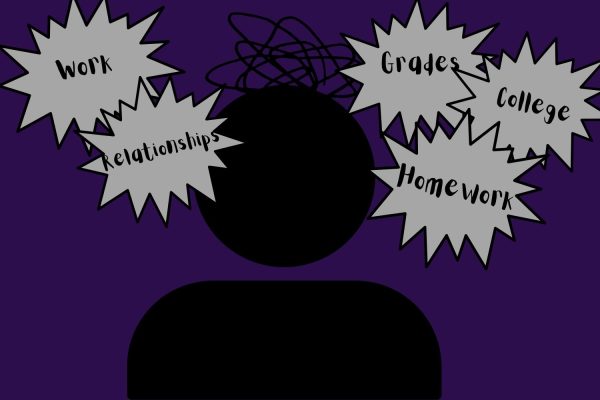It is time to finally stop using intellectual slurs
Graphic Illustration by Blake Loria
Ablest terms are outdated and are offensive to all people, whether targeted at individuals with intellectual disabilities or not. Using such terms can cause lasting damage to people with learning problems. Although not a new discussion, it is time to finally say goodbye to the word “retard.”
“That is so retarded.”
“Hey retard, you did not answer my text last night.”
“Are you mentally retarded, or something?”
These are common phrases heard around Canyon High’s campus. In spite of the posters hung in the halls and bathrooms or the verbal warnings from teachers, students have been using the word retard casually for decades.
It is time for us to take a step back and examine the consequences of using this word so flippantly, and more importantly, using it as a derogatory term. The problem does not lie with those who have an intellectual disability. The issue comes from the stigma built by those who choose to laugh at or degrade persons who learn differently. There is nothing wrong about having an ID. Each person, no matter their struggle or strength, has value and purpose in our society. Using the word creates barriers and hurts everyone, no matter their circumstance or challenge. There is not a positive connotation of the word, and it is time we remove it from our vocabulary.
One entry of the Merriam-Webster Dictionary defines the word as “a foolish or stupid person,” however it has become an umbrella term for any person who has an intellectual disability. It spans from individuals who struggle with dyslexia, to those found on the autism spectrum, to genetic disorders like Down syndrome and Prader-Willi syndrome. Many people use the slur to describe any person who learns differently, creating damaging stereotypes. They also perpetuate the harmful past of the word.
In the United States, a push to close facilities dedicated to serve those with severe intellectual disabilities and the lack of public support and education on how to serve these people have led to a dramatic increase in the number of of people with intellectual disabilities in prisons. When there is not substantial social services to those individuals, and the stigma of having these disabilities is strong, many turn to crime. The Bureau of Justice Statistics reports prison inmates are four times more likely to have a cognitive disability. The real world implications of using this slur are happening now, just as they did in the past.
The use of the word and the societal attitude of those who have mental disabilities goes deeper than crime statistics; it dehumanizes individuals into a blatant stereotype. It is on par with using a racial slur against a person of color. When someone calls another individual the r word, even as a joke, they are specifically targeting a characteristic that is pre-determined. We all have problems, and as long as we turn on each other and pin-point each of our struggles, we will never get better as a society.
According to Spread the Word–an organization dedicated to eliminating the use of the r-word–it is segregative and excludes vast groups of people from society. The word locks persons with IDs in closets and shuts them off from the world. It ignores their complexity and humanity. There is a correlation between the high frequency use of the word “retarded” and mental health problems among those with IDs. The Journal of Developmental Behavioral Pediatrics reports at least 30 % of those impacted by some type of ID have mental health problems, and the same people are more likely to experience bullying, harassment, neglect and stigma from their peers at school. Calling a person a the harmful word does not impact the moment; it impacts society.
Additionally, the use of the r-word is not relegated to any faction of society. It is not bound by political affiliations; both sides of the isle have simultaneously called for the end of the word and continued its hurtful legacy. Progress has been made to end its use.
In 2010, President Barack Obama signed Rosa’s Law, a bill that changed the official terminology of mental retardation to intellectual disability, and Texas removed the term “mentality retarded” from all official documents in 2011.
However, just as great progress has been made in removing the stigma of an ID, people continue to perpetuate the word. Using the word belittles individuals with learning problems. There is nothing wrong with having an intellectual disability, and as long as we use words like this, we continue the assertion that hurting others is okay. It is up to each person to stop the its use.
When you say it, correct it. When you you hear it, stop it.

Hi guys! I’m Caroline, and this is my fourth year in the journalism program and my third year writing for The Eagle's Tale. I am so excited to get back to working for the paper and writing about the wonderful people here at Canyon High as a senior....













